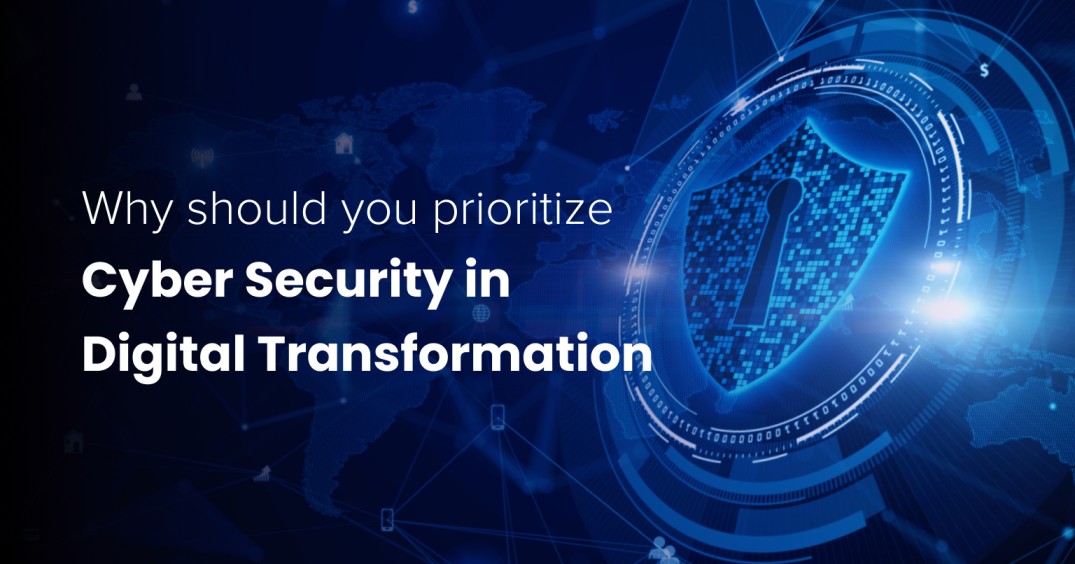Why should you prioritize cyber security in digital transformation?
Security is regaining priority in digital strategies as businesses adapt to an increase in remote working due to COVID-19. Cybersecurity has become the top technology priority for digital transformation projects. In today’s world, the efficiency in embracing new technologies defines a company’s competitiveness. As businesses go remote, many businesses have transferred their data to the cloud, to add value to themselves and their customers.
Over two years since the pandemic struck, many companies have fallen prey to malicious attackers on the cloud. An incident of cyber-attack is capable of disrupting the company’s strategy of transformation and development. It is critical to ensure continuity of the company’s processes while providing a tight security net to its data.
Here are a few reasons why you should prioritize cybersecurity in digital transformation:

1. Concerns over the security of digital assets: Moving to remote work was a revelation in itself for businesses. Companies were confronted with a lot of challenges and risks. More than 1.1 million cyber-attacks were reported across India in 2020 as per a study by data platform Statista. Managing a detailed inventory of digital assets and ensuring their protection is not an easy task. Any security leak might disrupt the company’s daily operations. To avoid that, the digital assets need to be accounted for and secure.


2. Security concerns on the cloud: Moving to the cloud offers companies significant flexibility as well as potential security benefits. Still, there are certain challenges, most commonly when a company becomes dependent on only one cloud service provider. Businesses must have a deep understanding of how their company is using and securing the cloud. It is important to learn in advance what solutions and formats are utilized by the supplier, as well as their compatibility with formats by other vendors, and to assess the cybersecurity level of this supplier. A DTO can arrange this internally or hire third-party IT experts for help.


3. Cyber-incidents due to human mistakes: Significant benefits are offered as humans are involved in digital transformation. But this mustn’t prevent us from neglecting the cyber-incidents that can take place due to human mistakes or lack of expertise. It is therefore pertinent to developing skills through training, to operate new technologies securely.


4. To ensure business continuity: To avoid business disruption, new ways to cyber-incident management must be developed. Regular assessment of the incident response plans, regular crisis-management training for all members, including the board can be followed.
Digital transformation is a challenging but manageable task. Cyber security must be given priority in the digital transformation process to ensure that the business adapts to the change in technology, without compromising on security. This will facilitate a secure digital transformation and stable development for the business for years to come.
What Does Cybersecurity for Businesses Encompass?
Cybersecurity entails the deployment of technologies, protocols, and procedures to shield against cyber-attacks intended to disrupt network systems or illicitly access data.
The most effective forms of cybersecurity or digital security services for your business provide holistic protection against a myriad of threats. Ideally, your solution should encompass a firewall, antivirus software, anti-spam filters, wireless security measures, and online content filtering. Explore how your business can leverage a complimentary Fortinet cyber threat assessment to enhance its cybersecurity posture.
What are the Benefits of Cybersecurity for Your Business?
Protects Your Business: Cybersecurity solutions offer digital fortification to your enterprise, safeguarding your employees from potential threats like Adware and Ransomware.
Enhanced Productivity: Viruses can significantly impede computer performance, hindering work processes. Effective cybersecurity mitigates such risks, optimizing your business’s productivity potential.
Instils Customer Confidence: Demonstrating robust protection against cyber breaches instills confidence in your customers, assuring them that their personal data remains secure. This bolstered trust is one of the paramount benefits of cybersecurity for your business.
Safeguards Your Customers: Ensuring your business’s resilience against cyber threats extends protection to your customers, shielding them from potential breaches that could affect them indirectly.
Prevents Website Downtime: For businesses hosting their own websites, a cyber breach could have catastrophic consequences. Infection of your system might force your website to shut down, resulting in financial losses from disrupted transactions. Effective cybersecurity measures avert such risks, ensuring uninterrupted website operation and safeguarding revenue streams.
Guidelines for Achieving Cybersecurity Success
Remain Agile: Cybersecurity is an ongoing process, not a one-time task. Given the evolving threat landscape and the dynamic nature of IT ecosystems and business requirements, your cybersecurity strategy must remain adaptable.
Tailor Best Practices to Your Needs: While there are abundant resources offering guidance on enhancing security, including best-practices guides and established frameworks, it’s crucial to customize these approaches to suit your organization’s unique requirements and infrastructure.
Engage Leadership: Establishing a robust digital security services program necessitates close collaboration between IT departments and senior leadership. Executives bring a broad understanding of the organization’s current priorities and strategic objectives, crucial for informing cybersecurity initiatives and securing necessary resources. To garner executive support, IT teams must demonstrate how cybersecurity measures can avert costly data breaches, ensure regulatory compliance, and generate other financial benefits.
Adopt a Comprehensive Approach: A successful cybersecurity strategy encompasses various facets, including data management, business process management (BPM), enterprise risk planning (ERP), user authentication, data protection, and vulnerability assessment and mitigation.
Looking for expert technology consulting services? Contact us today.










